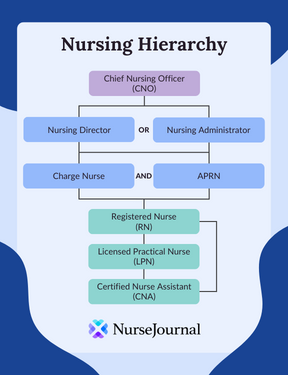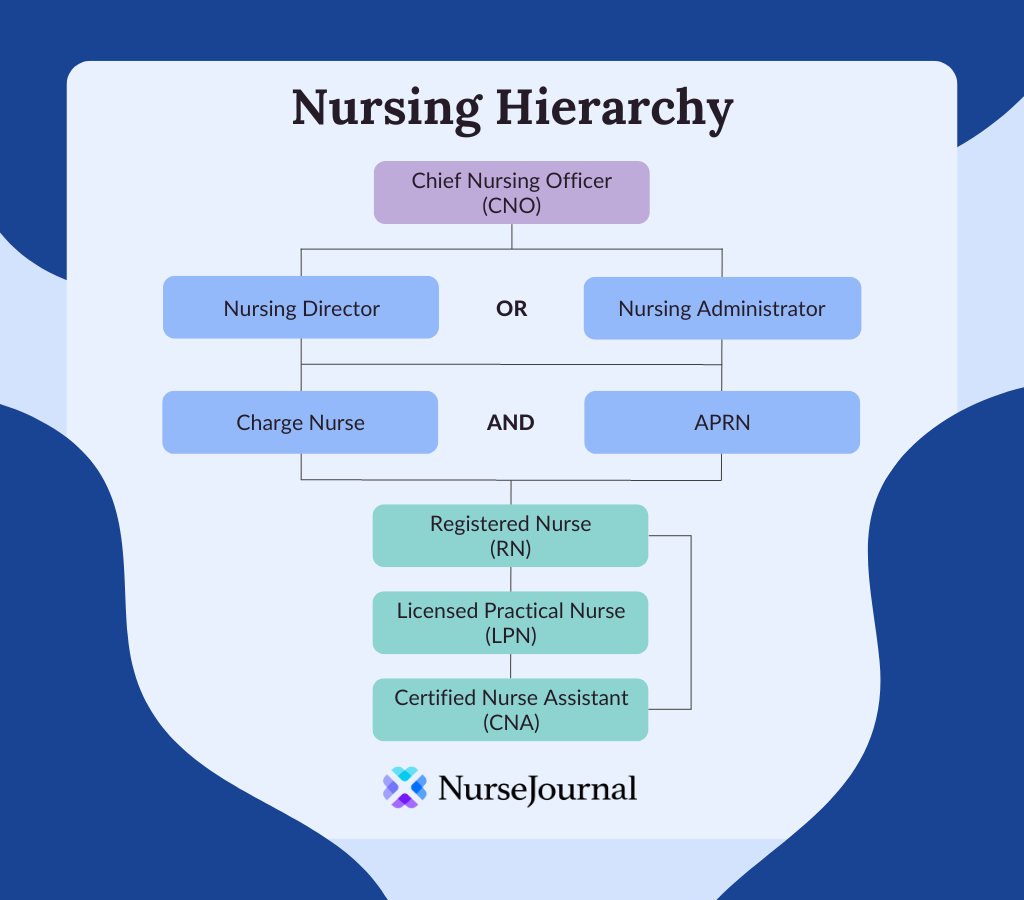A Guide to the Nursing Hierarchy

Will you spend your whole career in direct patient care, get an advanced degree, or lead nursing staff? To help you make that decision, learn more about each level in the nursing hierarchy.
The nurse hierarchy is the leadership structure nurses follow within a healthcare setting. The hierarchy starts with certified nursing assistants at the base and ends with the chief nursing officer at the top. Find out about the nursing hierarchy and where your career goals fit.


Entry-Level Nursing
All nurses start with an entry-level nursing position. Nurses have the most interaction with patients at this level. You need at least two to three years of entry-level experience to get your advanced degree in nursing or pursue leadership positions.
Your path into the nursing field depends on how much time you have for school and the authority, autonomy, and salary you want after graduation.
Certified Nursing Assistant (CNA)
Certified nursing assistants, or nursing assistants, help patients with activities of daily living such as moving, bathing, eating, and dressing. They also check vital signs and look for changes in their patients’ conditions. CNAs report any patient condition changes to the licensed practical nurse (LPN) or registered nurse (RN) they work under.
- Education: High school diploma or GED certificate and a state-approved CNA training program
- Average Annual Salary: $36,220 (Bureau of Labor Statistics, May 2022)
- Autonomy: None. CNAs must work under an LPN or RN, even though they have their own CNA license.
- Authority: None.
Licensed Practical Nurse (LPN)
Licensed practical nurses monitor patients’ health, provide basic patient care and comfort, and keep patient records. LPNs may insert catheters, care for infants, and change bandages. Responsibilities for LPNs vary between where they live and where they work.
- Education: Licensed Practical Nurse (LPN) program
- Average Annual Salary: $55,860 (BLS, May 2022)
- Autonomy: LPNs provide basic medical care under an RN’s or medical doctor’s direction.
- Authority: Licensed practical nurses supervise CNAs. Depending on their state, they may supervise other LPNs and licensed vocational nurses (LVN).
Registered Nurse or Staff Nurse (RN)
Registered nurses monitor patients’ health, provide patient care, and educate patients. RNs have increased autonomy to coordinate patient care with other healthcare providers, participate in care planning, and advocate for patients. The responsibilities of an RN vary based on whether they work in a hospital, outpatient setting, or nursing home.
- Education: Associate Degree in Nursing (ADN) or Bachelor of Science in Nursing (BSN)
- Average Annual Salary: $89,010 (BLS, May 2022)
- Autonomy: RNs have the autonomy to work with, rather than under, physicians and advanced practice providers to coordinate and carry out patient care.
- Authority: Registered nurses supervise LPNs and CNAs.
Advanced Practice Nursing Positions
Advanced practice nursing positions require a master of science in nursing (MSN) or doctor of nursing practice (DNP) degree. The advanced degree gives you greater autonomy to create and manage care plans, provide patient care, educate patients, and oversee nursing staff. These advanced degrees allow you to specialize in family medicine, midwifery, anesthesia, or nursing education.
Nurse Practitioner (NP)
Nurse practitioners diagnose, treat and educate patients. NPs and medical doctors share many of the same responsibilities, but NPs are more likely to specialize in primary care. Most NPs work in physician’s offices, hospitals, and outpatient care centers. Their responsibilities vary based on their specialty and the state where they practice.
- Education: Master of Science in Nursing (MSN) or Doctor of Nursing Practice (DNP)
- Average Annual Salary: $124,680 (BLS, May 2022)
- Autonomy: Nurse practitioners may have complete autonomy over patient care if they work in a full-practice authority state.
- Authority: Nurse practitioners oversee RNs, LPNs, and CNAs.
Clinical Nurse Specialist (CNS)
Clinical nurse specialists provide expertise and consultations with other nurses in their specialty. They focus on researching and implementing best nursing practices in their specialty. They specialize in family practice, pediatrics, adult-gerontology, or neonatal care. They serve in leadership roles as educators, preceptors, researchers, advisors, and policy advocates.
- Education: Master of Science in Nursing (MSN) or Doctor of Nursing Practice (DNP)
- Average Annual Salary: $98,050 (Payscale, September 2023)
- Autonomy: Clinical nurse specialists can practice independently without restriction, depending on their state’s requirements.
- Authority: Clinical nurse specialists precept and teach nurses and student nurses.
Certified Nurse Midwife (CNM)
Certified nurse midwives provide patient care and education before, during, and after birth. They oversee births, treat patients with sexually transmitted diseases/infections (STD/STI), educate patients about healthy pregnancies, and care for newborns and their parents after birth.
- Education: Master of Science in Nursing (MSN) or Doctor of Nursing Practice (DNP)
- Average Annual Salary: $122,450 (BLS, May 2022)
- Autonomy: Certified nurse midwives may have full autonomy over their patients’ prenatal, delivery, and postnatal care if their state is an independent practice authority state.
- Authority: CNMs oversee labor and delivery nurses, LPNs, and CNAs.
Nurse Educator
Nurse educators teach, mentor, and motivate student nurses at all levels of nursing education. They work in colleges, universities, and healthcare settings. They develop nursing courses and monitor their effectiveness. Nurse educators supervise student nurses during their clinical experiences. They also research the best evidence-based practices.
- Education: Master of Science in Nursing (MSN) or Doctor of Nursing Practice (DNP)
- Average Annual Salary: $84,180 (BLS, May 2022)
- Autonomy: Nurse educators have the autonomy to create a curriculum, monitor the curriculum’s effectiveness, and supervise student nurses in the clinical setting.
- Authority: Nurse educators oversee student nurses at all nursing education levels. They oversee clinical experience and simulation labs.
Certified Registered Nurse Anesthetist (CRNA)
Certified registered nurse anesthetists, or nurse anesthetists, take patients’ medical histories, monitor patients’ vital signs, give local and general anesthesia, and collaborate with physicians. Most CRNAs work in outpatient care as the only anesthesia provider on their shift.
- Education: Doctor of Nursing Practice (DNP) or
- Average Annual Salary: $205,770 (BLS, May 2022)
- Autonomy: CRNAs may have full autonomy depending on the supervision requirements of their state, practice setting, or care model.
- Authority: CRNAs can supervise student registered nurse anesthetists (SRNA), registered nurses, LPNs, and nursing assistants.
Nursing Leadership Positions
Nursing leadership positions oversee nursing care for their department or organization, lead nurses on their team and in their organization, and often do not work directly with patients. They require previous experience in direct care roles and tend to need an advanced degree.
Charge Nurse
Charge nurses plan patient care for their shift, schedule and oversee nursing staff on their unit, and act as a connection between nursing staff, physicians, and hospital leadership. They determine what care to administer during their shift, and make sure the nursing staff use their resources effectively to deliver that care.
- Education: Bachelor of Science in Nursing (BSN) or Master of Science in Nursing (MSN)
- Average Annual Salary: $80,160 (Payscale, September 2023)
- Autonomy: Charge nurses have the autonomy to make decisions about their nursing practice, plan patient care in their unit, and oversee the practice of the nurses in their unit.
- Authority: Charge nurses supervise and schedule RNs, LPNs, and CNAs on their shifts and in their units.
Nursing Director
Nursing directors, or nursing administrators, use their clinical knowledge and experience from previous nursing positions to lead nursing staff within a healthcare organization. Nursing directors do not provide direct patient care. Instead, they represent nursing staff in meetings, hire and recruit nurses, and conduct performance reviews and professional development.
- Education: Master of Science in Nursing (MSN) or Doctor of Nursing Practice (DNP)
- Average Annual Salary: $97,050 (Payscale, September 2023)
- Autonomy: Nursing directors have the autonomy to make decisions about hiring, firing, training, and evaluating nursing staff.
- Authority: Nursing directors oversee the hiring, recruiting, training, and performance of nursing staff within a department or organization.
Chief Nursing Officer (CNO)
Chief nursing officers manage nursing care for the entire hospital or health system, with a focus on safety and promoting optimal patient outcomes. They work alongside other members of hospital leadership to develop patient care strategies. They develop emergency procedures, budgets, and professional development. CNOs do not deliver direct care, but they are required to have an active nursing license in case of staffing emergencies.
- Education: Master of Science in Nursing (MSN) or Doctor of Nursing Practice (DNP)
- Average Annual Salary: $140,330 (Payscale, September 2023)
- Autonomy: Chief nursing officers have the autonomy to lead and make decisions about the nursing staff and all nursing care.
- Authority: Chief nursing officers serve as the lead nurse in an organization and have authority over all nursing care, budgeting, staffing, and policies
Choosing the Level of Nursing That is Right for You
All the levels of the nursing hierarchy are necessary. They all impact the best care for patients. Which level of nursing you choose comes down to whether you want to work directly with patients or if you want to lead nurses and make organizational decisions.
Consider the level of education, pay, autonomy, and authority you want. Decide where you want to be in the nursing hierarchy based on the kind of nursing that:
- Meets your career goals
- Excites you
- Gives you professional satisfaction and success
Frequently Asked Questions about the Nursing Hierarchy
What are the different levels of nurses?
The different levels of nurses are certified nursing assistants (CNA), licensed practical nurses (LPN), registered nurses (RN), charge nurses (RN), advanced practice registered nurses (APRN), nursing directors or administrators, and chief nursing officers (CNO).
What is the highest level of nursing?
The highest level of nursing is the chief nursing officer (CNO). CNOs have a graduate or doctoral nursing degree. They oversee all the nursing care in a hospital or healthcare facility.
Why is it important to understand the nursing hierarchy?
Understanding the nursing hierarchy helps you understand each nursing role’s education, authority, autonomy, and salary. With this knowledge, you can make informed decisions about your short-term and long-term career goals.
How does nursing education relate to nursing hierarchy?
More nursing education leads to positions with higher pay, autonomy, and authority within the nursing hierarchy. Some exceptions include certified registered nurse anesthetists (CRNA) who need a doctoral degree (DNP) to get an advanced position, or charge nurses who need a bachelor’s degree (BSN) for a leadership position.
Sources
Average charge nurse hourly pay. (2023). Payscale
Average chief nursing officer salary (2023). Payscale
Average clinical nurse specialist salary. (2023). Payscale
CNS independent practice map. (2022). National Council of State Boards of Nursing
Occupational Outlook Handbook. (2021). U.S. Bureau of Labor Statistics
Page last reviewed on February 9, 2023
Are you ready to earn your online nursing degree?
Whether you’re looking to get your pre-licensure degree or taking the next step in your career, the education you need could be more affordable than you think. Find the right nursing program for you.